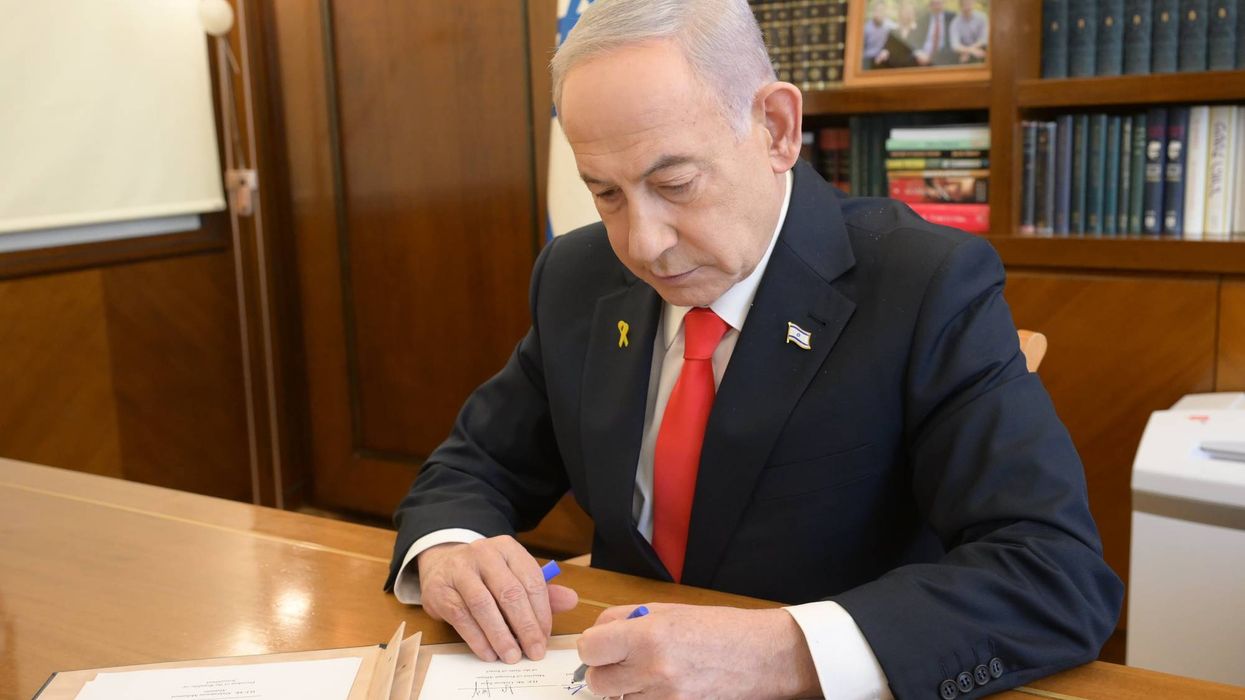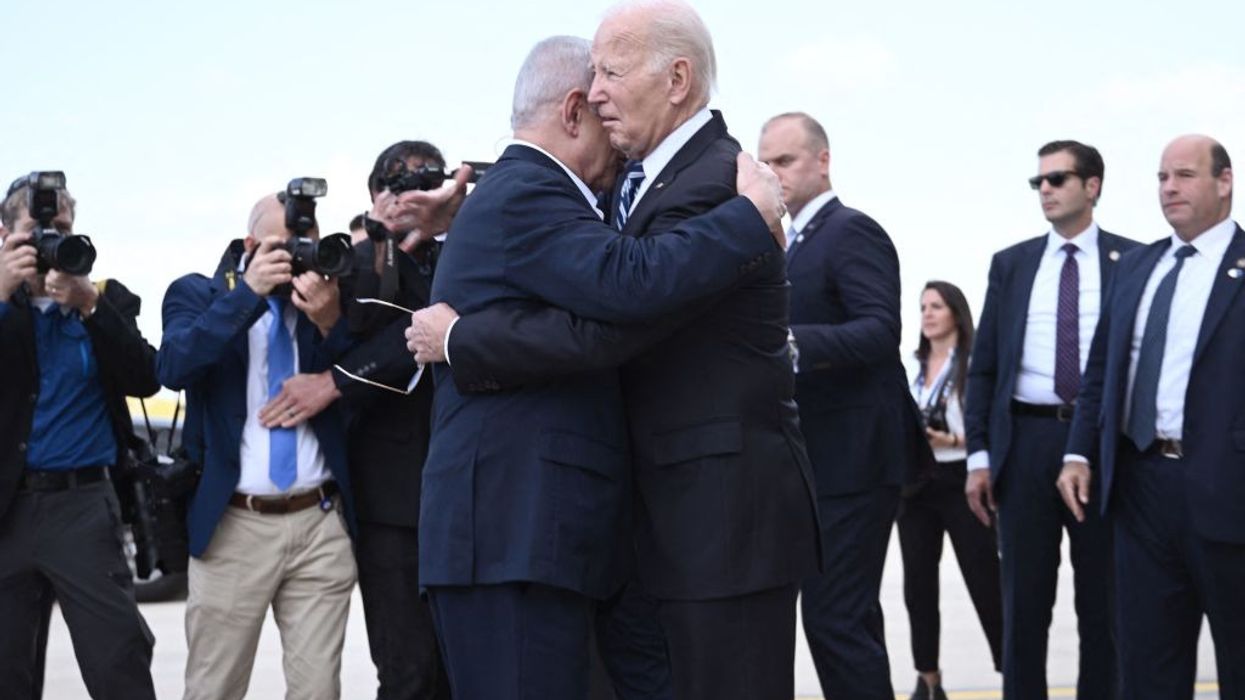Under Trump and his son-in-law adviser, Jared Kushner, Washington became a policy playground for the settler movement, with which the former U.S. ambassador to
Israel, David Friedman, was unashamedly aligned.
Whatever Trump does, the scale of Palestinian resistance during this war has demonstrated that the agency in the conflict does not lie with extremist leaders in Israel or Washington.
Consequently, in his first term, Trump upended decades of policy by
recognising Jerusalem as the capital of Israel and moving the U.S. embassy there; he disenfranchised the Palestinian Authority by closing down the Palestine Liberation Organization (PLO) office in Washington; he allowed Israel to annex the Golan Heights; he pulled out of the nuclear accords with Iran; and he assassinated Qassem Soleimani, the most powerful Iranian general and diplomat in the region.
Even more damaging for the Palestinian struggle for freedom was Trump’s sponsorship of the
Abraham Accords.
This was—and still is—a serious attempt to pour concrete over the grave of the Palestinian cause, constructing in its place a superhighway of trade and contracts from the Gulf that would make Israel not just a regional superpower, but a vital portal to the wealth of the Gulf.
On October 6, 2023, the day before the Hamas attack, the Palestinian cause was all but dead. The Palestinian struggle for self-determination felt like the baggage of an older generation of Arab leaders, which was being unceremoniously dumped by the new generation.
All the diplomatic talk was of
Saudi Arabia’s impending decision to normalise relations with Israel, with the picture of Saudi Crown Prince Mohammed bin Salman shaking hands in public with Israeli Prime Minister Benjamin Netanyahu dangling as the prize lying just behind the next corner. One more push, and it would be in the bag.
If that charge sheet is not long enough, it could easily be argued that Trump’s second term will be even worse for Palestinians than his first was.
Wildest Impulses
This time around, and with the Republican partyprojected to have control over both houses of Congress, there will be no adults in the room to correct the president’s wildest impulses.
After all, did Friedman not just publish a book entitled
One Jewish State: The Last, Best Hope to Resolve the Israeli-Palestinian Conflict, in which he argues that the U.S. has a biblical duty to support Israel’s annexation of the West Bank?
“Palestinians, like Puerto Ricans, will not vote in national elections… Palestinians will be free to enact their own governing documents as long as they are not inconsistent with those of Israel,” Friedman writes.
In allowing Netanyahu to claim total victory, the U.S. administration under a first Trump presidency buried not just the prospect of a two-state solution, but along with it, the Zionist dream of a liberal, secular, democratic Jewish state.
So will Trump 2.0 not simply presage yet more territorial changes, such as the annexation of Area C of the occupied West Bank, the permanent division of Gaza, the return of Israeli settlements to northern Gaza, and the clearing of the border area in southern
Lebanon?
All of this could, and no doubt will, come to pass under a second Trump term, with no brakes.
I do not for one second underplay or underestimate the sacrifice in blood that Palestinians have paid so far—the death toll in Gaza could easily be three times higher than the current official figure—or could yet pay for all that is about to come.
But in this column, I will argue that the settler movement, backed by a second Trump term, is in the process of burying any chance that Israel will prevail as an apartheid Jewish minority state in control of all the land from the river to the sea.
Irreversible Consequences
Let me make two points about the situation that existed on October 6, before I go on to deal with the irreversible consequences of everything that has happened since. And make no mistake—they are irreversible.
The first is that in allowing Netanyahu to claim total victory, the U.S. administration under a first Trump presidency buried not just the prospect of a two-state solution, but along with it, the Zionist dream of a liberal, secular, democratic Jewish state.
The liberal version of this state had been the main vehicle of Israeli expansion, with its salami slices making ever-deeper inroads into historic Palestine. By killing it, the liberal fig leaf dropped from the Zionist project, and the religious Zionist forces who were once regarded as fringe and even as terrorists, such as far-right politician Itamar Ben Gvir and the Kahanists, became mainstream.
This fundamentally altered the whole project to establish Israel as the dominant state between the river and sea. It suddenly became the only state, and one that was governed by religious fanatics; by people wishing to
level the Dome of the Rock and Al-Aqsa Mosque.
It became a state governed by the religious dogmas of Jerusalem not by the European Ashkenazi internet geeks and sophisticates of Tel Aviv. Under the first Trump presidency, the rift between these two camps became irreconcilable and fundamentally destabilising.
The second change that the first Trump presidency brought about, or rather completed, took place in Palestinian minds.
A whole generation of Palestinians born after the
Oslo Accords came to the conclusion that all political and nonviolent ways of seeking an end to the occupation were blocked; that there was no longer any meaning in recognising Israel, let alone trying to find anyone in it to talk with.
Talking to Israel became a meaningless exercise. The political route was blocked not only inside Palestine, but outside it.
To their eternal shame and discredit, U.S. President Joe Biden and his secretary of state, Antony Blinken, kept all the “achievements” of the first Trump presidency in place—first and foremost the Abraham Accords.
Biden's Humiliation
Trump’s big boast during his first term of office was that he made all these changes to the status quo of the Palestinian conflict, and the sky did not fall in.
But the sky did fall in on October 7, and everything that Trump and Biden had done before that contributed to the Hamas attack, which provided the same shock to Israel that 9/11 provided to the US.
After the Hamas attack, it was impossible to ignore the Palestinian cause. It moved from the periphery of global human rights causes to the very center.
It’s not a scorecard of total humiliation for Biden, but when the history of this period is written, Biden will emerge as a weak leader.
But Biden didn’t get it. An instinctive Zionist, he allowed Netanyahu to humiliate him. His first reaction to the Hamas attack was to give Israel everything it wanted,
thwarting all international moves at the United Nations for a cease-fire. His second reaction was to draw red lines, which Netanyahu proceeded to ignore.
Biden told Netanyahu
not to reoccupy Rafah and the Philadelphi Corridor. Netanyahu did it anyway. Biden told Netanyahu to allow aid trucks into Gaza, and Netanyahu mostly ignored him. Biden told Netanyahu not to invade Lebanon; Netanyahu did it. Biden told Netanyahu not to attack Iranian nuclear and oil facilities, and Netanyahu listened to him—for now at least.
It’s not a scorecard of total humiliation for Biden, but when the history of this period is written, Biden will emerge as a weak leader.
He also emerges as a leader who facilitated genocide. The amount of heavy bombs that the U.S. supplied, and that Israel used against overwhelmingly civilian targets in Gaza and Lebanon, over the past year far outweighs the U.S.’ own use of such bombs during the entire Iraq war.
If the Israeli state has fundamentally changed after October 7, so too has the Palestinian mindset.
The scale of the killing—the official Palestinian death toll from the war has
exceeded 43,000, and the real count could be several times higher, with the degree of destruction rendering most of the Gaza Strip uninhabitable—has crossed all red lines for Palestinians, wherever they live.
No Room for Negotiations
From now on, there is no talking or negotiating with a state that does this to your people. The only two votes in the Israeli parliament, the Knesset, that secured
unanimity among Jewish Israeli MKs included legislation to veto a Palestinian state, and a law banning UNRWA, the U.N. agency for Palestinian refugees.
These two votes alone told Palestinians that they would be deluded to think that a post-Netanyahu government would bring any relief from occupation. In a deeply divided Israel, the only thing that all Jews could agree on were two measures that fundamentally made life impossible for Palestinians, the majority of the population.
In such extreme conditions, there are only two alternatives: to do nothing and die, or to resist and die. Hundreds of thousands, if not millions, believe in the latter.
Palestinians are not raising the white flag. They are staying, and fighting, and dying where they live.
Consequently, Hamas is at the height of its popularity in areas where the Muslim Brotherhood was on October 6 at its weakest: in the occupied West Bank,
Jordan, Lebanon, and Egypt.
Walk around Nablus’s old city and ask people who they support. The answer will not be the defunct Palestinian president, Mahmoud Abbas. By a substantial margin, it will be Hamas, a group that is proscribed in the
U.K. and other countries as a terrorist organization.
In Jordan, Hamas is praised by the whole population, East Bankers and Palestinians alike, because Israel’s assault on the occupied West Bank is seen as an existential threat to the kingdom.
Walk into a Palestinian home for dinner on Friday, and everyone will tell you that this death toll, and the deaths under a second Trump term, are the price to be paid for liberation from occupation.
This generation of Palestinians has shown a degree of fortitude that no previous generation showed. They are not cutting and running, like former President Yasser Arafat’s PLO did when surrounded by Israeli forces in Beirut in 1982.
No one in Gaza is fleeing to
Tunisia, and few to Egypt, which is just across the border—and far fewer than Netanyahu intended. Palestinians are not raising the white flag. They are staying, and fighting, and dying where they live.
'Time for Complete Victory'
This is the answer to those who argue that looking at the long term is all very well, when the short-term duty is simply to survive. There is no short term for Palestinians any more. It’s over. There is nothing left.
The short term means returning to your tent. It means going back to your home in the occupied West Bank, knowing that tomorrow you could be burned out by settlers armed by Ben Gvir. There is no going back. Palestinians have all lost too many family members for surrender to be considered an option.
Viewed from the perspective of a Palestinian farmer clinging to his stony ground in the face of repeated settler attacks in the hills of South Hebron, it’s a toss-up as to whether Kamala Harris as U.S. president would have made any difference. If anything, she could well have been an even weaker influence on Netanyahu than Biden was.
Letting Netanyahu think he can achieve “total victory” only means feeding the forest fires of a regional war.
So we have ended up with Trump once again.
The settler right are popping bottles of champagne in celebration. Speaking in the Knesset, Ben Gvir welcomed Trump’s election victory,
saying that “this is the time for sovereignty, this is the time for complete victory”.
Netanyahu is also using this period to clear out the stables in his government by sacking his defence minister,
Yoav Gallant.
Trump thus has two clear paths when he assumes power next January, assuming that Biden continues to fail to secure a cease-fire in Gaza. He can either carry on where he left off, and continue to allow the U.S. to be led by the nose by the Christian evangelical right, or he can do what he strongly hinted he would do to the
Muslim leaders he met in Michigan—which is to stop Netanyahu’s war.
Either path is littered with elephant traps.
Fires of Regional War
Letting Netanyahu and his alliance with Ben Gvir achieve “total victory” would mean, in reality, the ethnic cleansing of two-thirds of the occupied West Bank, with a huge refugee influx ending up in Jordan—an act that would be seen in Jordan as a cause for war.
It would mean the expulsion of Palestinians from northern Gaza and the permanent destruction of southern Lebanon, with the assumed right of Israel to continue bombing Lebanon and
Syria.
Each of these actions would lead to more war, which Trump has pledged to stop. Remember that one of the last things Gallant said before he was sacked was that
a war in Syria to cut Iran’s supply lines was inevitable.
Stopping the war would present Netanyahu with his biggest political peril, as doing so before a return of the hostages would be tantamount to a Hamas and Hezbollah victory.
Letting Netanyahu think he can achieve “total victory” only means feeding the forest fires of a regional war.
Nor would getting Saudi Arabia to recognise Israel, putting the cherry on top of the cake of the Abraham Accords, make any difference—although I strongly doubt whether Mohammed bin Salman would be stupid enough to do this anymore.
The reality is that such deals have no meaning while Palestine does not have its own state, and while each Arab leader feels the anger of their own population on Palestine.
But forcing Netanyahu to stop the war, in the way a strong Republican president like Ronald Reaganforced Israel stop the bombing of Beirut four decades ago, would also have seismic consequences.
It would stop the religious Zionist project in its tracks. It would feed the growing dissatisfaction within the Israeli army’s high command, who have already signalled they have achieved all they can in Gaza and Lebanon, and are suffering from war fatigue.
Stopping the war would present Netanyahu with his biggest political peril, as doing so before a return of the hostages would be tantamount to a Hamas and Hezbollah victory.
Hope for the future
One year on, there is still no credible project to install a government in Gaza that would allow the withdrawal of Israeli troops. The moment they do, Hamas reemerges. The only government of post-war Gaza that could succeed would be a technocratic government that is agreed with Hamas—and that in itself would represent a huge humiliation for Netanyahu and the army’s vow to crush the resistance movement.
Whatever Trump does, the scale of Palestinian resistance during this war has demonstrated that the agency in the conflict does not lie with extremist leaders in Israel or Washington. It lies with the peoples of Palestine and across the Middle East.
And that is the biggest hope for the future. Never before in U.S. electoral history has Palestine been a factor in turning the youth vote away from the Democratic Party. Henceforth, no Democratic leader wishing to rebuild their coalition can ignore the Palestinian, Arab, and Muslim vote.
It may be that as Biden departs, we have seen the party’s last Zionist leader. That in itself is of immense significance for Israel.
The irrational, quixotic, transactional occupant of the White House—the president who insists that his advisers reduce all their analysis to one sheet of A4, which they are lucky he actually reads—will only accelerate the destruction of the status quo in the Middle East that he started in his first term.
With much help from Netanyahu, Trump has already killed the dream of Zionist liberal democracy that lasted for 76 years.
This is some achievement in itself. In a second term, he will only hasten the day the occupation ends.



